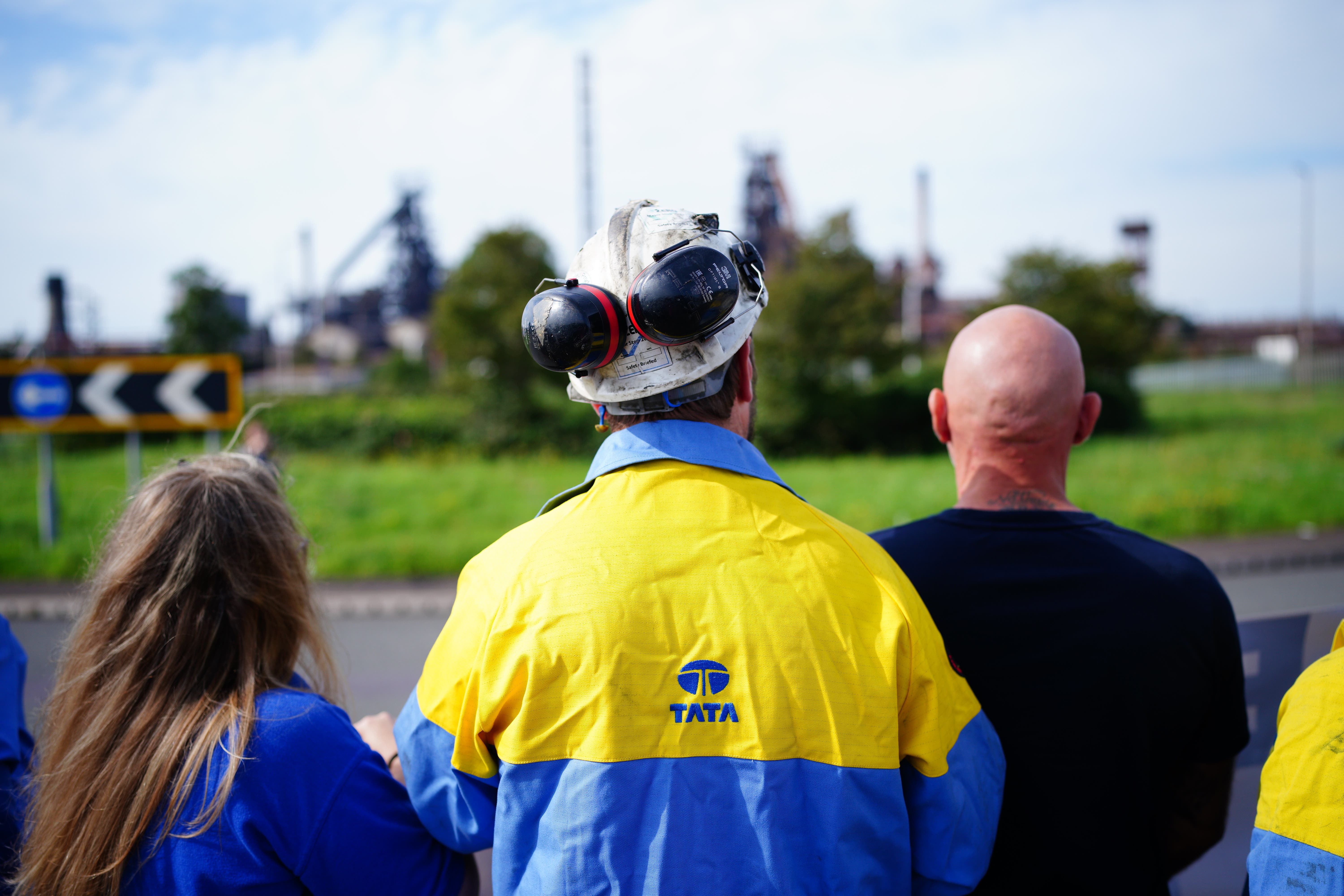Tata Steel decision ‘a massive kick for the whole of South Wales’
The company has confirmed plans to close blast furnaces at its Port Talbot plant, with the loss of up to 2,800 jobs.

Your support helps us to tell the story
From reproductive rights to climate change to Big Tech, The Independent is on the ground when the story is developing. Whether it's investigating the financials of Elon Musk's pro-Trump PAC or producing our latest documentary, 'The A Word', which shines a light on the American women fighting for reproductive rights, we know how important it is to parse out the facts from the messaging.
At such a critical moment in US history, we need reporters on the ground. Your donation allows us to keep sending journalists to speak to both sides of the story.
The Independent is trusted by Americans across the entire political spectrum. And unlike many other quality news outlets, we choose not to lock Americans out of our reporting and analysis with paywalls. We believe quality journalism should be available to everyone, paid for by those who can afford it.
Your support makes all the difference.Tata’s decision to close blast furnaces at its biggest UK plant, with the loss of up to 2,800 jobs, is a “massive kick for the whole of South Wales”, a union representative has said.
About 2,500 jobs could be lost in the next 18 months at the Port Talbot plant in South Wales, as Tata presses ahead with making steel more environmentally friendly, requiring a smaller workforce.
A further 300 roles could be affected over the next few years, which could include the potential consolidation and rationalisation of cold rolling assets in Llanwern, Newport, once the required investments are completed at Port Talbot.
Unions put forward alternative plans which would not have led to such drastic job cuts, but they were rejected, although some parts were accepted. Tata said continued blast furnace production was “not feasible or affordable”.
Andrew Gutteridge, chairman of the Multi Unions Llanwern works, described the situation as “absolutely devastating” and called for Tata to change its mind.
He told the PA news agency there would not be a future for the UK steel industry if the plans were not challenged.
When asked about the impact on the community, Mr Gutteridge replied: “It will absolute ruin the community. Your local newsagents, your chip shops, your supermarkets – everything in this area will be affected.
“And not just here in this area, in Bridgend, Neath, up in the Valleys which are already decimated from the mines years ago. This is a massive, massive kick for the whole of South Wales really.”
Each job at the plant is believed to create at least three jobs in the local community.
The Port Talbot site is Tata’s biggest employer in the UK, with around 4,000 workers based there.
Vaughan Gething, minister for the economy in the Welsh Government, described the plans as a “devastating blow” for workers and the wider community.
Today’s news is a cause of real grief and upset as well as anger from the community here
He told the PA news agency: “Steel working really does bring something to this town.
“Not just in the multiplier of jobs – we think there are at least three jobs reliant on every job here in the steel works – but they’re well paid jobs here.
“It’s not a community that has a significant amount of well-paid employment around it to replace the scale of the job losses that have been proposed. It’s not the most well-off part of Wales, never mind the rest of the UK.
“So today’s news is a cause of real grief and upset as well as anger from the community here.”
He said the Welsh Government was pushing for “the best deal for steel, not the cheapest” and would continue to engage with Tata around its proposals.
Mr Gething called on the UK Government to “enter the pitch and actually bat for Wales and bat for Britain”, describing steelmaking as a “sovereign asset”.
“The final whistle hasn’t been blown yet,” he added.
“It’s still possible that if there is a general election in the right time this year, you could still see a future for blast furnace steelmaking, and a genuinely just transition to low-carbon steel production here in Wales.”
Andrew RT Davies, leader of the Welsh Conservatives in the Senedd, said he believed a blast furnace could have remained open during the transition period.
He called for an explanation about why this was not part of Tata’s plans.
“I remain unconvinced that a blast furnace could not be kept open during the transition to the arc furnaces that Tata have agreed to, protecting many jobs in the short to medium-term – this needs to be explained fully as to why this hasn’t been done by the company,” Mr Davies said.
“Many thousands of jobs have been protected, with record investment from the UK Conservative Government, the story of Port Talbot steel is far from over with its sustainable future secured.”
Luke Fletcher, Plaid Cymru MS for South West Wales and the party’s economy spokesperson, said the plans by Tata were “utterly catastrophic”.
“Wales is facing the absolute annihilation of the steel industry,” he said.
“The Westminster Government has allowed this key strategic industry to wither on the vine.
“The key question is now whether or not the UK Government is happy to lose the ability to produce new steel and become the only country in the G20 unable to produce steel from scratch.
“To safeguard our ability to produce steel from scratch, to protect jobs, the UK Government must now nationalise the plant in Port Talbot.”